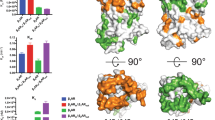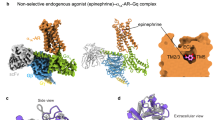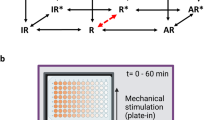Abstract
OBSERVATIONS from several laboratories have suggested that the well established classification of adrenergic receptors into α and β subtypes is not immutable. Several groups have reported that in isolated perfused frog hearts, stimulation of cardiac rate and contractility by catecholamines has the properties of a classical β adrenergic response when experiments are performed at warm temperatures (25°–37° C) but of an α adrenergic response when experiments are performed at cold temperatures (5°–15° C)1–3. At warm temperatures, the order of potency of agonists in stimulating these preparations—isoproterenol>adrenaline>noradrenaline—is classical for a β adrenergic receptor. Similarly, effects of the catecholamines at warm temperatures are blocked by propranolol but not by the α adrenergic antagonist phentolamine. When the same experiments are performed at temperatures below 25° C, the order of potency of agonists is reversed to that characteristic of α adrenergic receptors. Also at lower temperatures α adrenergic antagonists such as phenoxybenzamine and phentolamine block the effects of adrenaline, whereas β adrenergic antagonists such as propranolol are ineffective. Gradations of response can be achieved by varying the temperature between 37° C and 10° C. Similar observations have been reported for the rat heart1. Also in a dog heart–lung bypass preparation the β receptors seem to become ineffective at 15° C, whereas α receptors retain their effectiveness4. On the basis of such observations, Kunos et al.3 proposed that α and β adrenergic receptors may represent allosteric configurations of the same receptor macromolecule which could be modulated by among other factors, temperature.
This is a preview of subscription content, access via your institution
Access options
Subscribe to this journal
Receive 51 print issues and online access
$199.00 per year
only $3.90 per issue
Buy this article
- Purchase on Springer Link
- Instant access to full article PDF
Prices may be subject to local taxes which are calculated during checkout
Similar content being viewed by others
References
Kunos, G., and Szentivanyi, M., Nature, 217, 1077 (1968).
Buckley, G. A., and Jordan, C. C., Br. J. Pharmac., 38, 394 (1970).
Kunos, G., Yong, M. S., and Nickerson, M., Nature, 241, 119 (1973).
Price, J. M., Swann, J., and Nayler, W. G., Archs int. Pharmacodyn. Ther., 168, 296 (1967).
Robison, G. A., Butcher, R. W., and Sutherland, E. W., in Cyclic AMP, 146 (Academic Press, New York, 1971).
Lefkowitz, R. J., Sharp, W. G., and Haber, E., J. biol. Chem., 248, 342 (1973).
Krishna, G., Weiss, B., and Brodie, B. B., J. Pharmac. exp. Ther., 163, 379 (1968).
Rosen, O. M., Erlichman, J., and Rosen, S. M., Molec. Pharmac., 6, 521 (1970).
Sobel, B., and Mayer, S., Circulation Res., 32, 407 (1973).
Author information
Authors and Affiliations
Rights and permissions
About this article
Cite this article
CARON, M., LEFKOWITZ, R. Temperature immutability of adenyl cyclase-coupled β adrenergic recptors. Nature 249, 258–260 (1974). https://doi.org/10.1038/249258a0
Received:
Revised:
Issue Date:
DOI: https://doi.org/10.1038/249258a0
This article is cited by
-
Mechanism of action of cardiovascular drugs-calcium blockers (review)
Pharmaceutical Chemistry Journal (1984)
-
Temperature dependence of phenoxybenzamine effects and the adrenoceptor transformation hypothesis
Nature (1975)
-
Interchange of adenyl and guanyl cyclases as an explanation for transformation of β- to α-adrenergic responses in the rat atrium
Nature (1975)
Comments
By submitting a comment you agree to abide by our Terms and Community Guidelines. If you find something abusive or that does not comply with our terms or guidelines please flag it as inappropriate.



